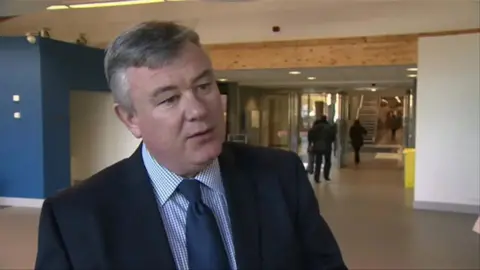In a recent ruling, the standards committee of Isle of Anglesey County Council decided not to suspend Councillor Ieuan Williams despite his controversial remarks made during a council meeting in June 2023, where he stated that “all Tories should be shot.” The councillor, who previously held the position of council leader from 2013 to 2017, faced scrutiny after his comments came to light, prompting an investigation by the public services ombudsman.
Williams, who serves the Lligwy ward as an independent councillor, expressed that his comments stemmed from feelings of anger and frustration related to the pressing issue of poverty within the community. Following the incident, he took the initiative to apologize for what he described as a “crass remark” and voluntarily referred himself to the ombudsman, acknowledging that his words had “brought the council into disrepute.” In contrast to Williams’ expectations, while the ombudsman confirmed the disrepute caused by his comments, they curtailed any further action, leading the standards committee to propose a censure rather than a suspension.
In terms of reprimand, a censure is a formal expression of disapproval issued by an organization or governing body, which in this case describes the committee’s response to Williams’ behavior. During the meeting, Williams openly admitted to breaching the council’s code of conduct, a claim corroborated by a report indicating that he failed to adhere to the expected standards of conduct.
The factors influencing the committee’s decision included the fact that the misconduct was an isolated incident and that Williams proactively reported the incident himself. His willingness to cooperate with the investigation and acknowledgment that he needed to modify his behavior played pivotal roles. Williams’ promise to monitor his compliance with the code of conduct moving forward likely influenced the council’s decision to impose a mere censure instead of more severe consequences.
This incident mirrors several other controversial situations involving councillors, illuminating the delicate balance public officials must navigate regarding free speech and accountability. For instance, a recent headline noted another councillor suspended for making inflammatory comments about Welsh identity, indicating a growing sensitivity within governmental structures to comments that may be interpreted as threatening or laden with violence. Conversely, the standards committee’s choice to censure Williams but not suspend him raises questions about consistency in addressing misconduct among council members.
Williams’ career trajectory, including his roles as deputy leader and as head of education and Welsh language portfolios, underscores his previous prominence in local governance. However, following his remarks, council Chief Executive Dylan Williams condemned his comments as “inappropriate and unacceptable.” The decision to censure, rather than suspend Williams is seen by many as a notable action, signaling that while there are repercussions for misconduct, these do not always equate to forfeitures of position or authority.
Supporters of Williams may view the decision as lenient yet justified, believing that given his public remorse and cooperative stance, a censure suffices in this case. Critics, however, may argue that such statements — particularly those advocating violence — should invariably attract harsher punishment to maintain public trust and safety. The standards committee’s decision and the subsequent public discourse surrounding it will likely contribute to ongoing debates about ethical standards in political discourse and the responsibility of elected officials to conduct themselves within the limits of accountability.
Moreover, this incident casts a spotlight on the broader implications of political rhetoric in today’s climate and how expressions of frustration can be misconstrued or challenge societal expectations. The council’s ongoing commitment to uphold standards amidst such controversies remains pivotal in overcoming the challenges of navigating ethical governance in contemporary politics.



